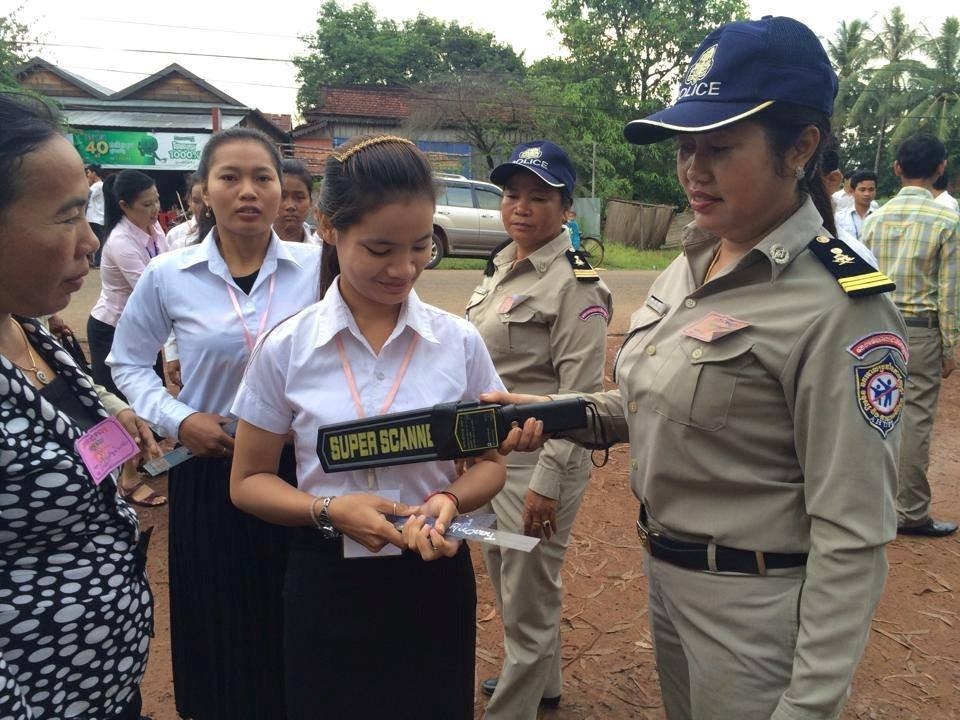The 2014 Cambodian grade 12 examination concluded with only a few reported cases of cheating. Last year, an estimated half million US dollars was spent on various bribes and cheat-sheets by students, mainly funnelled to teaches in hopes of obtaining a passing grade. Whereas years previous saw huge lines of students at photocopy centres printing examination cheat sheets just prior to the school bell, this year saw long lines of students slowly entering testing centres as each student was individually frisked (see photo above).
The 11-month campaign by Education Minister Hang Chuon Naron to eliminate corruption seems to have paid off. Naron told Xinhua news at the conclusion of the two day examination:
During this year’s exam, there was no cheating because proctors have strictly frisked all candidates for cheat sheets before allowing them to seat for exams.
Even Rong Chhun, the president of Cambodian Independent Teachers’ Association and no friend of the ruling party, lauded the examination:
This year’s exam was much better than those in previous years and is acceptable.
The reforms to the examination system under Naron included: (1) limiting the creation of the examination to only a small group of “trusted” people in order to eliminate leakage; (2) checking all students before entering school, so no phones or cheat sheets were brought in; (3) allowing the anti-corruption unit to monitor inside the classrooms in all 150+ test centres and giving monitors the power to eject students/proctors accordingly; (4) allowing independent monitors to stand outside of all classrooms to watch the monitors for any irregularities; and (5) using an awareness campaign that threatened jail time for any one caught cheating—student or teacher alike. One student captured the draconian environment created by these reforms as such:
It’s damn strict this year.
Overall, it’s an incredible feat for an examination that has long (long) experienced some level of cheating. Moreover, that the ministry of education admitted cheating was a problem and decided to address it is a huge change of rhetoric and action. In 2007, for instance, then education minister Kol Pleng said,
We cannot make comment before we have a meeting, but [these allegations] are nothing new. The allegation of cheating on exams happens every year, but in reality there is none.
This 2007 comment is interesting because in 2002 there was another attempt at eliminating cheating. The 2002 reform efforts included the use of computers to score examinations (and thus eliminating the possibility of lenient grading by human teachers) and orienting questions towards university admission (and thus making the actual test harder). These reforms worked: Whereas in 1998, UNESCO reported that 79 percent of students passed the grade 12 examination, after the reforms in 2002, over 60 percent of students failed. Of those lucky students who did pass, most scored D or E grades, which are at the lower end of the passing grade spectrum. Indeed, only three students got A’s, 28 got B’s, and 435 got C’s.
Past education minister Kol Pleng either forgot the 2002 episode of examination reforms entirely, or clearly remembered them as something not to be repeated. In 2007, under his watch, the passing rate reached nearly 73 percent. Since then, the rate has climbed above 80 percent, almost double the 2002 rate. Cheating, even if unacknowledged by the ministry, returned to normal. 2002 was an outlier.
Although this year’s results aren’t due out until the end of August, I suspect we will see a repeat of 2002. The passing rate will plummet, and, as a consequence, 2014 higher education admission rates will decline (students must pass the grade 12 examination to gain entry to higher education). This will only leave students and families disappointed. As one parent put it:
I just want him to get a good grade and be allowed to go to college.
If this does happen, what will the minister of education do? Will cheating return in order to give parents and students hope of finding higher paid employment by going to university like it did post-2002? Will the passing rate be lowered like it was for the 9th grade examination in order to allow more students to pass, thus keeping the anti-cheating reforms in place? Will the focus shift to education provision to increase quality? History shows the likely status quo is for a return to cheating as normal, but social change is always possible. Perhaps we are seeing the beginning of a totally new examination structure. Only time will tell.

